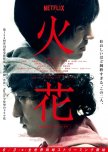This is a drama of the highest quality about the struggles of artists pursuing their careers suffused with humour, warmth, and poignancy.
Hibana (Spark) is a drama produced by Netflix which means that its production team had an enormous budget and creative freedom. Both of those were used splendidly. Every shot is artsy, every secondary character is played by the likes of Sometani Shota and Kadowaki Mugi. More importantly, the drama was allowed to show the unvarnished lives of artists living on the fringe of society, and not on that decadence & debauchery kind of fringe - just the plain old 'don't have a place to stay' kind.
This 'plain old' down to earth feel is achieved through constant situational humour and occasional manzai performances. Despite the pathos of heart-wrenching conflicts, the drama never allows the viewer to take it too seriously. Thus, it stays in the realm of accessible art house rather than heavy drama.
The conflicts come from the grim reality of artistic field. Those who practice their art rarely have a luxury of a reliable job. In Japan, where the expectation for a man to be a breadwinner is still as strong as ever, the source of the main characters' reluctance to get involved with the women they genuinely care about is all too clear.
But the call of art is too powerful. Manzai, in particular, is an ancient art, and it's too easy to see the teachings of the Kamiya-sempai as a manzai-zen that the main character eagerly learns as a faithful adept. And in the ancient times 'ascetic' life style was a given. Moreover, only the most blessed get to worship the muse, and the threat of failure always hangs over artists. 'When will I have to give up my dream?' is a heart-breaking question all too familiar to those who still fight for their art even as their colleagues vanish in the corporate world or win the lottery of the big break. When the success finally comes it inevitably leads to the chorus of 'sell-out' accusations with the loudest voice being the artist's own.
Hayashi Kento and Namioka Kazuki give a wonderful nuanced performances all throughout the drama. They are great together; Hayashi Kento is especially good at portraying devotion so the viewer never doubts Tokunaga's loyalty to Sempai and his teachings. Namioka Kazuki's Sempai is so easily recognised, I'm sure everyone knows at least one such kind, charismatic, and hopeless sensei.
Suda Masaki and Kiritani Kenta replaced those actors for the movie version of Spark. While they are great actors in their own right, one can't help but wonder if more conventionally attractive appearances played the main role in that decision. The movie, by the way, is less raw and unvarnished, though, it still retains the notorious final scene.
Hibana (Spark) is a drama produced by Netflix which means that its production team had an enormous budget and creative freedom. Both of those were used splendidly. Every shot is artsy, every secondary character is played by the likes of Sometani Shota and Kadowaki Mugi. More importantly, the drama was allowed to show the unvarnished lives of artists living on the fringe of society, and not on that decadence & debauchery kind of fringe - just the plain old 'don't have a place to stay' kind.
This 'plain old' down to earth feel is achieved through constant situational humour and occasional manzai performances. Despite the pathos of heart-wrenching conflicts, the drama never allows the viewer to take it too seriously. Thus, it stays in the realm of accessible art house rather than heavy drama.
The conflicts come from the grim reality of artistic field. Those who practice their art rarely have a luxury of a reliable job. In Japan, where the expectation for a man to be a breadwinner is still as strong as ever, the source of the main characters' reluctance to get involved with the women they genuinely care about is all too clear.
But the call of art is too powerful. Manzai, in particular, is an ancient art, and it's too easy to see the teachings of the Kamiya-sempai as a manzai-zen that the main character eagerly learns as a faithful adept. And in the ancient times 'ascetic' life style was a given. Moreover, only the most blessed get to worship the muse, and the threat of failure always hangs over artists. 'When will I have to give up my dream?' is a heart-breaking question all too familiar to those who still fight for their art even as their colleagues vanish in the corporate world or win the lottery of the big break. When the success finally comes it inevitably leads to the chorus of 'sell-out' accusations with the loudest voice being the artist's own.
Hayashi Kento and Namioka Kazuki give a wonderful nuanced performances all throughout the drama. They are great together; Hayashi Kento is especially good at portraying devotion so the viewer never doubts Tokunaga's loyalty to Sempai and his teachings. Namioka Kazuki's Sempai is so easily recognised, I'm sure everyone knows at least one such kind, charismatic, and hopeless sensei.
Suda Masaki and Kiritani Kenta replaced those actors for the movie version of Spark. While they are great actors in their own right, one can't help but wonder if more conventionally attractive appearances played the main role in that decision. The movie, by the way, is less raw and unvarnished, though, it still retains the notorious final scene.
Was this review helpful to you?























